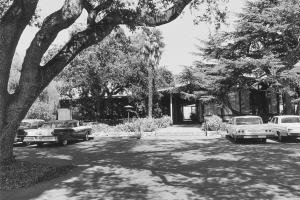History

The establishment of the Center For Advanced Study in the Behavioral Sciences in 1954 embodied the Ford Foundations’s optimism about the contribution of basic science and social science towards “advancing human welfare.”
The original charge to CASBS was: “Through scientific work, to increase knowledge of factors which influence or determine human conduct, and extend such knowledge for the maximum benefit of individuals and society.” Although the specifics of implementing that charter have changed over time, the Center remains committed to the goals it was founded to serve.
For over sixty years the Center has been inviting a select group of social science and other scholars to its hilltop location for yearlong fellowships. Their residencies, spent in individual studies overlooking the Stanford campus and Silicon Valley, are solely devoted to the production of knowledge. During their time at CASBS, fellows have no departmental commitments and no teaching. Proximity to scholars working in other social and behavioral science disciplines occur regularly at lunch and in fellows’ seminars, providing an opportunity for exposure to new methods, perspectives, theories, and problems.
CASBS became part of Stanford University in 2008 and is now one of the independent research centers at the university reporting to Vice Provost and Dean of Research. The Center's program has expanded to include groups of research affiliates, workshops, and ongoing projects.
Research, thinking, conversation, and writing done at the Center has had an enormous impact on both social science and society. Among the Center’s over 2,500 alumni, we count 26 Nobel Prize laureates, 25 Pulitzer Prize winners, 51 MacArthur Fellows, and 159 current members of the National Academy of Sciences. With few exceptions, most of these distinguished scholars came to the Center at crucial, often early, stages in their careers.
